What I’ve been reading this month
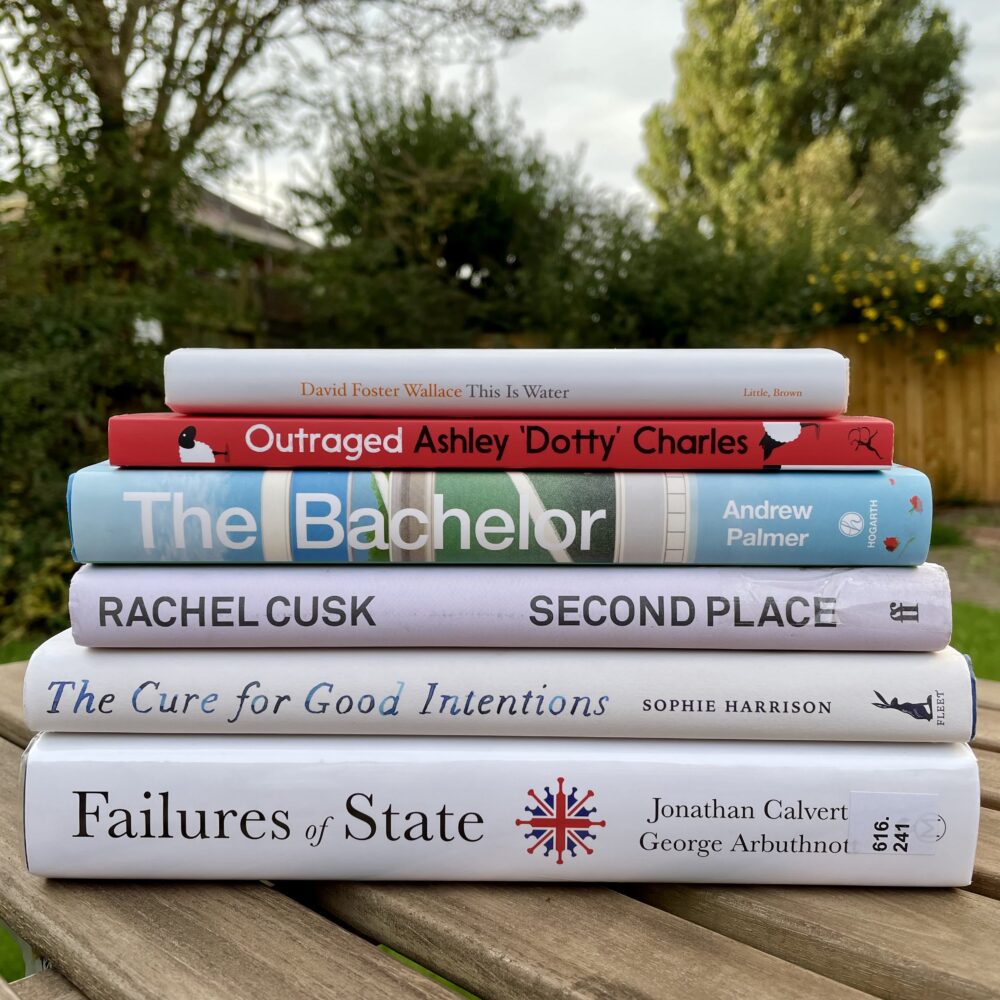
I’ve six books to tell you about this month: three excellent ones, and three weaker ones.
Failures of State by Jonathan Calvert and George Arbuthnott
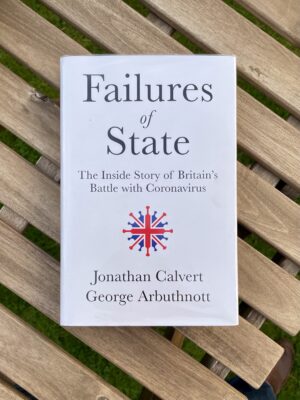
As COVID-19 has consumed almost all of my working life for the past nineteen months, I’ve been somewhat loath to read even more about it in my spare time. Yet, I found this recently published book by two investigative journalists from The Sunday Times extraordinary, gripping and devastating—and the experience of reading it, mildly reassuring.
The book starts with fifty pages on the history of coronavirus outbreaks around the world, and the likely sources of COVID-19. It then launches into 350 pages covering the response of (mostly) the UK Government to the pandemic up to the end of 2020. People often characterise NewsUK journalists as being supportive of Conservative governments, yet this book, which sticks to a mostly straightforward timeline of events, could not be more damaging to the Government’s claim to have handled the pandemic well.
Perhaps most damning of all is the section at the end where the authors explain that the Government’s response to their criticisms was to deny any errors in their handling of the crisis. It was this book’s elucidation of clear errors and lessons for the future that I found oddly reassuring: reflection, learning and continuous improvement is a cornerstone of any medical practice, and a routine part of health protection. Acknowledgement of errors felt like a return to normality—even where those errors have been on an unrecognisable scale.
Calvert and Arbuthnott include harrowing individual patient stories from the pandemic, which are tough to read. It’s also hard—as they themselves acknowledge—to be certain of how representative of the wider response each of these stories can be. Yet, their inclusion feels important to contextualise decisions and illustrate their human impact.
No work of journalism will ever be perfect, or fully reflect the truth of any situation: the blameless can be blamed, decisions made with the best available information at the time can look foolhardy in hindsight, and the real villains can go without mention. Perhaps Arbuthnott and Calvert are entirely wrong on key facts, or on where decisions were made, or on where they place the blame. But, right or wrong, this book feels like the first draft of the history of the UK Government’s response to the first part of the COVID-19 pandemic.
The Cure for Good Intentions by Sophie Harrison
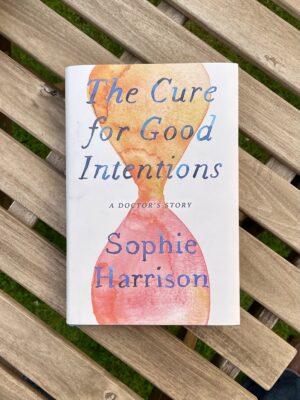
Sophie Harrison was an editor at Granta magazine before she decided to retrain as a doctor. She started medical school in 2003—the same year as me—and this memoir of her time at medical school through to her early career as a GP has just been published. I picked this up as I was aware of Harrison’s background and thought it was likely that she would write elegantly about her career, which, I thought, would be quite fun to read. I’ve somehow never really clocked her pieces in the LRB or the Financial Times Weekend, despite regularly reading both.
I thought this book was wonderful: warm and witty, exactly the tone I would like to strike if I had enough talent to write about my own medical training. The fact that Harrison is a contemporary of mine meant that her story brought back many memories from my own training, more-so than the many medical biographies from different eras. Harrison’s background also gives her a literary appreciation for medicine, and there are many references to medicine in literature contrasted with her experiences.
I enjoyed this enormously, more even than I expected. The combination of great writing and the memories it resurfaced as I read made this a real pleasure.
The Bachelor by Andrew Palmer
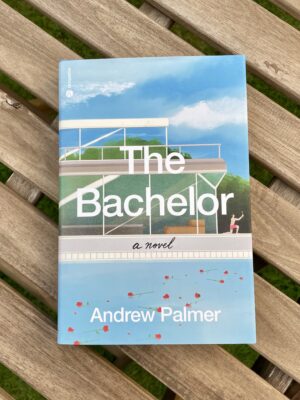
This recently published debut novel by Andrew Palmer has not received brilliant reviews, yet I very much enjoyed it.
This literary novel is set in the contemporary USA. Its protagonist is a man in his late 20s who has recent split from his “almost-fiancée” and returned to his home town, housesitting for a friend of his mother. The main plot of the book concerns the protagonist’s love life.
Alongside the main plot, the protagonist becomes caught up in watching the reality television series The Bachelor, and also in researching the life of the noted American poet John Berryman. Through these, the book becomes an exploration of the degree to which our perception of the world is real, and—separately—how much of it we believe. For example: is a well-researched biography any more or less ‘true’ than reality TV? And what is it about some aspects of art which allow us to suspend our disbelief and to be constantly questioning others? And why is it that those decisions are rarely rational: we can often end up questioning things we know to be meticulously researched and balanced more than those things which we consciously know to be manipulated.
I have never watched an episode of The Bachelor, though I’m sort of culturally aware of it, and I’m not familiar with the life and work of John Berryman. I can, however, completely relate to getting drawn into reality TV and to becoming deeply interested in a person’s biography. I think that this was perhaps helpful in that I appreciated the context but didn’t get too caught up in the specifics, and allowed me to enjoy the wider points.
Palmer integrates much broader examples into his discussion, including a very interesting bit on the truth of classical music, and the degree to which the composer’s score and the players’ interpretation are in opposition as the ‘reality’ of the music. Having said that, the metaphors do feel occasionally forced, such as the time the protagonist spends living in a house with (literal) glass walls.
Nevertheless, I enjoyed this. It was both gentle in tone and plot, but also clever in the ideas it explored and occasional profound in its expression of those ideas. But I appreciate that this isn’t how many others who have read it feel: perhaps it just happened to be right up my street.
Outraged by Ashley ‘Dotty’ Charles
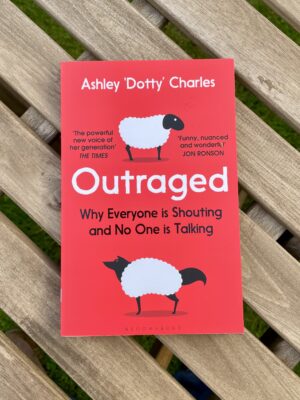
This brief 2020 book by Ashley ‘Dotty’ Charles argues that outrage on social media is often blown out of proportion, achieves little, and takes attention away from worthier causes and more constructive expressions of disapproval. Charles interviews a couple of people to explore these ideas further: Rachel Dolezal, the campaigner who identifies as black despite being born to white parents, and Katie Hopkins, the controversialist British media personality.
And… that’s it. Perhaps partly because the argument Charles is making seems pretty self-evident to me, I didn’t feel this book added much to the conversation. I enjoyed reading it: in particular, I liked the sense of wit running through it and the juxtaposition of personal anecdote and wider observation. However, I didn’t really feel that I learned much from it, and nor did it really give me any new perspective on the harms associated with social media.
One day, I’m pretty sure we’ll look back on the use of social media by healthcare organisations in the face of accumulating evidence of harm with much the same horror as we today look back on doctors’ promotion of cigarettes—but that’s an argument for another day.
Second Place by Rachel Cusk
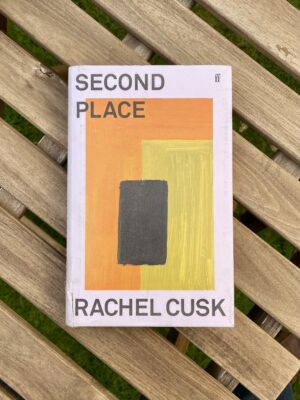
This recently published novel by Rachel Cusk appeared on the Booker long-list, so clearly has a lot going for it, but I’m afraid it didn’t really do much for me.
Second Place is a ruminative observational novel. After a strange introduction in which the protagonist is chased around Paris by the devil, the main plot point is the protagonist inviting a renowned artist to come and stay in her guest cottage. This is a study of character and the interrelationships of characters, with a particular focus on gender-related power dynamics. Yet, we only get to know about the characters through first-person, unreliable narration from the protagonist. This makes it slightly difficult to work out what is really going on or what anyone’s motivation is.
In the end, this proved to be a little too high concept for me, and not very engaging. I think this book would probably reward a close read with study and reflection, but didn’t work for me as a casually read novel.
This is Water by David Foster Wallace
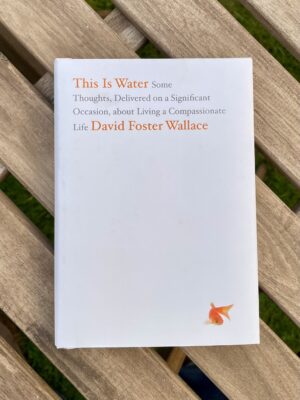
Fair warning that this is a bit of a rant.
David Foster Wallace’s 2005 commencement address at Kenyon College is something of a cultural touchstone of my generation, with references turning up frequently and in the oddest of places. Despite this, I’d never actually engaged with it. This problem would have been easy to resolve: a quick internet search brings up the complete text, and an audio recording of the speech is freely available (including in many presentations on YouTube).
But that’s not really my style: no, I chose to engage with this when the 2009 Little, Brown & Company edition was recommended when I was buying some books. It was printed in the US, and according to the dust cover, priced at $15, which makes the price I paid a substantial discount.
The content of the address is fine. The basic universal message is to think compassionately of others, but (as you’d expect from a great writer) it is written in a style which defies convention. I can see why it has stuck in people’s minds and become part of the common canon of my generation.
But the specific hardback book is awful. Presumably because the text is short, and the publisher wants to charge a premium, they’ve chosen to bulk out the length by presenting every sentence on a separate page. There are many examples of talented writers playing with form, but this isn’t one of them. This is a speech, where each line builds on the last to create a coherent whole, and someone has made the decision to butcher it into individual sentences. Some pages have two words on them.
I’m irrationally angry about this because it ruins the meter of the speech, it destroys the sense of an argument gradually building, and—frankly—because it is almost the worst possible way I can think of to convert this speech into a book. Not since I read No One Is Too Small to Make a Difference, a book in which the publisher has chosen to collect speeches which have large parts repeated from speech-to-speech, have I felt so annoyed by a production decision.
So do read the text: it’s just shy of 4,000 words, it won’t take you long, and it’s worth it (even if it isn’t totally mind-blowing). But don’t buy this book: read one of the many versions online, or listen to the audio on YouTube.
This post was filed under: What I've Been Reading, Andrew Palmer, Ashley Dotty Charles, David Foster Wallace, George Arbuthnott, Jonathan Calvert, Rachel Cusk, Sophie Harrison.